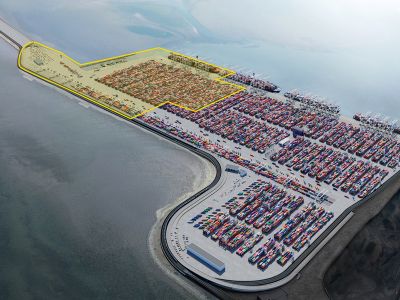Deltaport Expansion Berth Four Project – Coordinated Panel-level Assessment
Client
Global Container Terminals
Location
Vancouver, BC, Canada
Project Duration
2022 – 2023
Background
The proposed Deltaport Expansion, Berth Four Project (DP4 or the Project) is an expansion to the existing marine terminal, located primarily on federal lands in Delta, British Columbia. Project construction and operation activities may also overlap Tsawwassen First Nation and Government of BC water lots at Roberts Bank in the Fraser River estuary.
The Project involves the expansion of the existing terminal container storage and handling area, the addition of a fourth berth on the east side of the Roberts Bank Causeway, the expansion of the existing intermodal rail yard, and the relocation of several buildings and related services. The Project will require dredging to provide safe access for ships, and the relocation of the existing tug basin to the north end of the new berth four area. In addition, a proposed new marina for fishing and crabbing vessels is being considered in response to feedback from Tsawwassen First Nation
Project activities will also overlap the territories of more than 30 other Indigenous nations, due to construction activities at Deltaport and operational activities associated with one additional ship visiting Deltaport per week, and the increased movement of containers by trucks and trains.
Services Provided
Hatfield has been retained by GCT to support them through the coordinated impact assessment process, pursuant to Canada’s Impact Assessment Act, and BC’s Environmental Assessment Act. The federal Minister of Environment and Climate Change has referred the assessment to an independent review panel, which is the highest level of scrutiny a project can undergo.
Hatfield initiated the assessment by completing a detailed literature review and gap analysis for the Roberts Bank region and identified local and regional study areas which span the Fraser River Estuary. Field study workplans were also created and shared with Indigenous groups, regulators, and stakeholders to seek feedback and inform the completion of over 320 field visits. Key areas of focus include sediment and water quality, benthic infauna, marine vegetation (eelgrass, saltmarsh), birds, biofilm and marine mammals, including the endangered southern resident killer whales. Because the Project footprint overlaps with marine subtidal and intertidal fish habitat it also requires offsetting under the Fisheries Act (2019). Hatfield has developed a DP4 habitat offsetting strategy to assess the potential for harmful alteration, disruption, or destruction (HADD) of fish habitat, and the feasibility of offsetting opportunities.
In collaboration with GCT, Hatfield has regularly engaged with over 30 Indigenous groups on workplans and technical issues, including the Tsawwassen First Nation, Musqueam Indian Band, and Tsleil-Waututh Nation.
